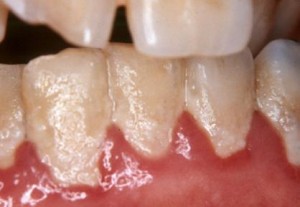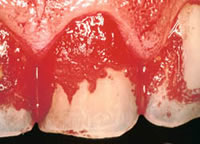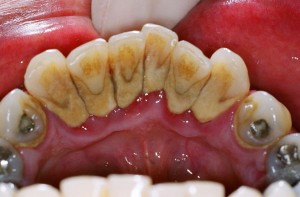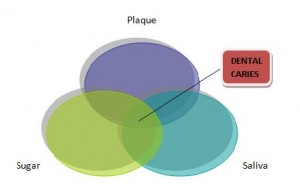Our mouth is constantly bathed in saliva and is exposed to the passage of food, the oral flora and many other stimuli considering the variety of objects that people put in their mouths such as cigarettes, pipes, hair-grips and so on. Nevertheless, our mouth has a remarkable ability to resist and adapt according to these stimulations. Our teeth are also exposed to the same factors and they can be covered wholly or in part by food debris, soft and hard deposits.
Â
Dental Plaque, the main cause of Dental Caries
Dental Plaque is a soft but adherent deposit of bacteria and their products, which forms on all tooth surfaces and other objects in the mouth, for example; fillings or dentures. This Plaque formation is a natural, physiological process and is an example of a biofilm, which means it is not a haphazard collection of bacteria but a complex association of many different bacterial species living together in a single environment. For instance, a newborn baby’s mouth is sterile but within a few hours, microorganisms appear; mainly Streptococcus salivarius. By the time the baby had his/ her first tooth out, a complex flora is established.
Â
Basically, Dental Plaque is scarcely visible in thin layers and it can be revealed only by the use of a Plaque-Disclosing Agent. In thick layers, it can be seen as yellowish or grey deposits which cannot be removed with mouthwashes or by irrigation but can be brushed off. It is usual to find it on areas which are difficult to reach by tooth brushing, for example; in between teeth or in severely crowded teeth. When Dental Plaque calcified or mineralized, it will become Dental Calculus or commonly known as Tartar. It is a ‘stony crust’ that forms on teeth and has long been associated with Gums Disease. Having said that; Dental Plaque is the main cause of dental caries.
Â
Â
     Â
Â
Â
Â
      Â
    Â
Â
Â
Â
Which Plaque Bacteria cause Dental Caries?
The widely accepted theory is the Ecological Plaque Hypothesis, which explains dental caries occur when there is a disruption in the balance of these 3 factors: plaque bacteria, sugar and saliva, driven by a change in the local environment in our mouth.
Â
As we frequently consume sugary food (acidic) for example, sweets or carbohydrate drinks, we have created a ‘cozy’ environment to feed on the plaque bacteria. Slowly by time, the growth of plaque bacteria increases and our teeth have become more susceptible to caries attack.
The key here is frequent and regular sugar intake to promote that acidic environment!
The consequence of this hypothesis is that both mechanical cleaning (i.e. tooth brushing) and some restriction of sugar intake are important in controlling dental caries progression.
Â
What happens when there is no tooth brushing?
As Dental Plaque accumulates with poor oral hygiene, this will lead to a condition known as Gingivitis or Inflammation of the Gums. You can observe a reddish appearance of your gums, can be swollen and usually it bleeds easily especially when you brush your teeth. It only takes 2-3 weeks, without any oral cleaning, for it to become an Established Gingivitis. However, Gingivitis is reversible on resolution of the inflammation.
Â

Dental Plaque. Reddish and swelling at the margins of the gums can be clearly seen on this picture, showing gingivitis.
Â
Â
Consequently, with further neglect of oral care, the condition will progress into Periodontal Disease (Periodontitis) or commonly known as Gums Disease. You will notice your gums have receded; teeth become ‘loose’ and sometimes bad breath. All these are due to the underlying destruction of your teeth bone which progresses gradually in a long period of time.  Hence, many people are not aware of this condition until it has severed and it is irreversible.
Â
Â
For this reason, it is always advisable to see your dentist once every 6 months to get early detection of any unwanted diseases.
Â
Â
Â
Â
Â
Â




